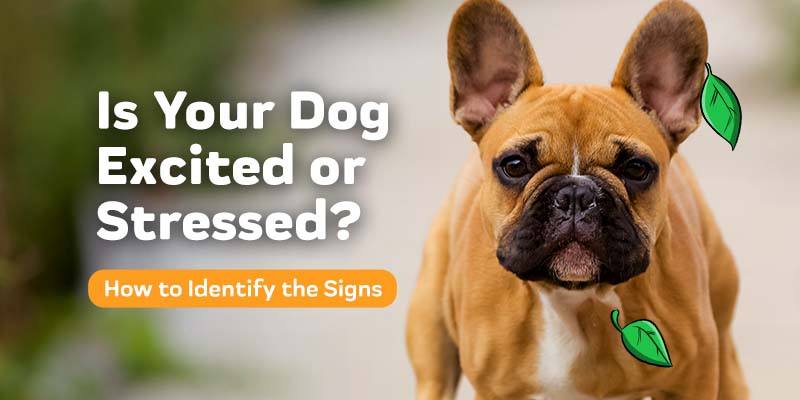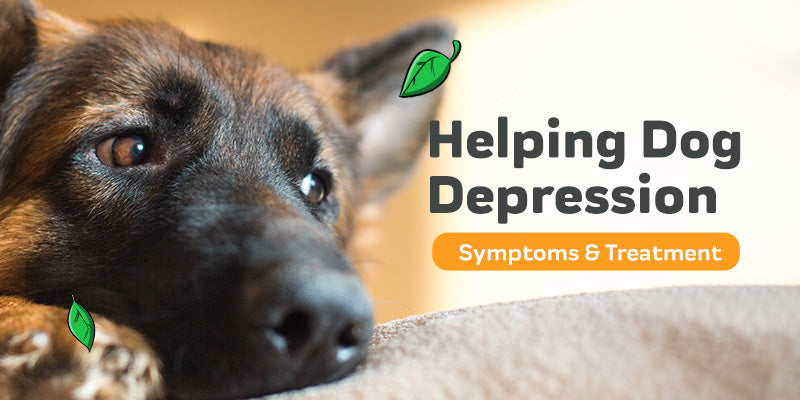- Are Excitement and Stress Similar?
- Identifying Stress: the Signs
- How to Help a Stressed Dog
- CBD Calming Chews
- Where to Buy CBD for pets?
- Conclusion
If you're a pet owner, then you know that dogs can exhibit similar behaviors when they're excited or stressed. It's important to be able to identify which behavior your dog is exhibiting before it gets worse in the future. In this blog post, we'll discuss the similarities and differences in the behaviors that dogs exhibit when they're excited or stressed, and we'll provide tips on how to handle each situation. We hope that this information will help you create a better relationship with your dog and make life easier for both of you!
Are Excitement and Stress Similar?
Stress and happiness may present similarly in dogs - a lot of barking, for example, or high-energy moves. While it can be difficult to tell the difference between the two emotions at first, there are some subtle clues that can help you discern your dog's emotional state. But first: did you know that one of the main causes of stress in dogs is overexcitement?
One of the most common causes of stress in pets is their owners' own energy. Many times, owners are unaware that their own stress or excitement, and anxiety can be transmitted to their pets. This can lead to confusion and even fear in animals.
Dogs are often put in situations where they feel overwhelmed, such as being in a large crowd or meeting new people. When this happens, they may try to cope by putting on a "performance." This means that they will try to act like they are not as weak or out of control as they actually feel - which stresses them even more.
Owners may not realize that their dog is feeling overwhelmed, and not happy. That is the reason why it is so important to be aware of the signs that your dog is actually stressed so that you can help them feel more comfortable in difficult situations.
Identifying Stress: the Signs
1 - Growling
There are a number of reasons why dogs may growl, but it is most often a sign that they are feeling uncomfortable or stressed. If your dog is growling, it is important to take note of the circumstances and try to identify what is causing the stress. Once you have determined the cause, you can work on helping your dog feel more comfortable and relaxed. Some causes and fixes may be:
Fear or anxiety: Dogs may growl when they are afraid or feel anxious. This can be due to a number of factors, including unfamiliar people or animals, loud noises, or sudden movements.
Territoriality: Dogs may also growl when they feel that their territory is being threatened. This can be in response to other animals, people, or even inanimate objects like toys or food. If your dog is growling due to territoriality, it is important to provide them with a secure and comfortable space where they can feel safe.
Pain: Dogs may also growl when they are in pain. This can be due to a number of causes, including injuries, illness, or even just discomfort. If your dog is growling due to pain, it is important to take them to the veterinarian for an examination. You can also give your pet CBD, which has been shown to help animals with pain
2 - Bark and Whine
Dogs may whine and bark when feeling happy, but they may do it as well when stressed. This is their way of communicating that they are not comfortable with the situation they are in. If your dog is whining or barking, try to remove them from the stressful situation and provide them with a calm environment. Dogs that are under stress may have a lower-pitched bark that sounds more growly than usual, while happy barking is usually high-pitched. They may also bark for longer periods of time than normal.
3 - Body Language
One of the most common signs that a dog is experiencing stress is changes in their body language. For example, a dog may tuck their ears back, tuck their tail between their legs, raise the hair on their back (known as hackles), lick their lips, or yawn excessively. This can also include panting, pacing, and avoiding eye contact. If you notice your dog exhibiting these behaviors, it's important to try to help them relax and feel comfortable again. One way you can do this is by providing them with a safe space, such as a quiet room or crate, where they can go to calm down. You should also avoid punishing your dog for being stressed, as this can only make the problem worse.

4 - Sleep and Appetite Changes
Stress can cause changes in sleep and appetite in dogs, so if you notice your dog sleeping more or less than usual, or eating less or more than normal, it could be a sign that they're feeling stressed. For comparison, healthy dogs generally sleep about 12 to 18 hours a day.
5 - Bad Behavior
If your dog is stressed, it may be more prone to destructive behaviors. Dogs that are under stress may chew on furniture or clothing, dig holes in the yard, bark excessively, or become aggressive. If your dog is already an adult, it is even more likely.

6 - Stiffness
One of the most common signs that your dog is stressed is when they freeze or get stiff. This usually happens when they see something that makes them nervous or uncomfortable. If you notice your dog doing this, it's important to try to figure out what is causing the stress and help them relax, because the next step may be a bite.
7 - Pacing
If you notice your dog pacing back and forth, it's likely a sign that they're feeling stressed or anxious. This behavior is often a response to something that is causing them discomforts, such as loud noises or unfamiliar surroundings. If you're concerned about your dog's pacing, try to identify what might be causing their stress and see if there's anything you can do to help them feel more comfortable.
How to Help a Stressed Dog
If your dog is stressed or anxious, there are a few things you can do to help them calm down. First, try to identify what is causing the stress or anxiety. If it is a specific situation, like being in the car or meeting new people, try to expose your dog to that situation in a gradual and positive way. For example, if your dog is anxious about car rides, start by taking them for short drives around the block. If they do well, gradually increase the length of the car ride. Be patient, and don't push too hard on your dog or the situation may get worse.
Another way to help calm a stressed or anxious dog is through calming exercises and training. There are a number of different exercises you can do, like having your dog practice deep breathing or learning how to relax in a calm environment. You can also try dog massage, which has been shown to be helpful for reducing stress and anxiety.
If your dog is still struggling with stress or anxiety, there are a number of medications that can help. Talk to your veterinarian about what options are available and what might work best for your dog.
Medications, however, usually come with some unwanted side effects. That's why many pet owners are seeking alternatives, like...
CBD Calming Chews
As an alternative to previous methods of relieving stress in pets, we also have Cannabidiol (CBD). CBD stands for cannabidiol, a compound found in cannabis plants like hemp. Different than what many people may think, CBD is perfectly safe for both humans and pets, especially because it does not produce the "high" effect commonly associated with cannabis use - that is caused by a substance called THC, not CBD. But not only it doesn't produce any high effects, it simply doesn't cause any of the super harsh side effects regular medication usually does!
CBD is known to interact with the body's endocannabinoid system, which includes a group of signaling molecules and their receptors that play a role in many physiological processes. CBD binds to receptors in the endocannabinoid system, which may help to regulate important functions like pain, inflammation, and anxiety, among other great benefits.
CBD has been shown to be effective in reducing anxiety and improving sleep in humans, and the same may be true for pets. A research concluded that CBD may reduce aggressive behaviour in dogs. If your pet is experiencing anxiety or difficulty sleeping, speak with your veterinarian about whether CBD might be a good option for them - just like thousands of pet owners in the US are already doing!
CBD is available in various forms, including oils, capsules, edibles, and even topical products - each one is made with different conditions in mind. Some of them are tasty, safe, and easy to give chews that will help relax and calm your dog so you can be sure that, when he seems happy, he truly IS happy!
Where to Buy CBD for pets?
If you want to buy CBD for pets, we recommend only the highest quality products that are organic, and third-party lab tested. Our CBD products meet all quality standards, making them a great option for those looking for high-quality products, and affordable prices.
Our CBD products can be used to help relieve anxiety, promote relaxation, and improve sleep in dogs, cats and horses. If you're interested in trying CBD for your pet, we offer a 30 Days Money Back Guarantee program!
Conclusion
If you’re looking to better understand your pet and how they’re feeling, it’s important to be able to identify the difference between excitement and stress. By being aware of these cues, you can provide them with the best possible care. Do you have any questions related to the topics we brought? Comment below, and our team will be prompt to clarify your question!


















